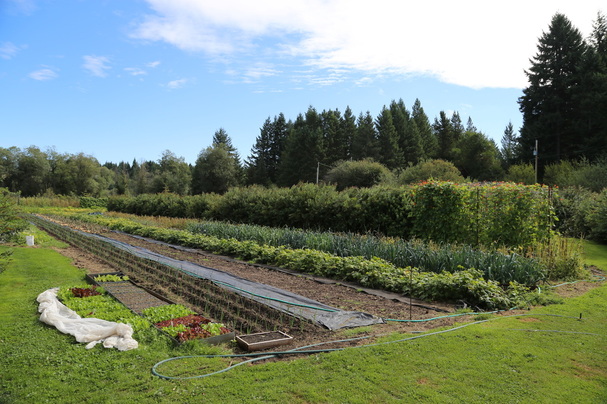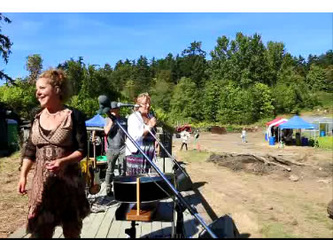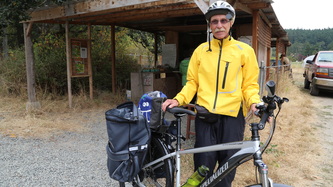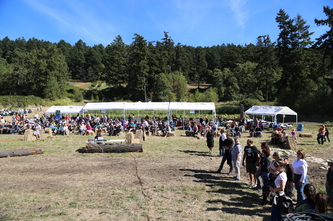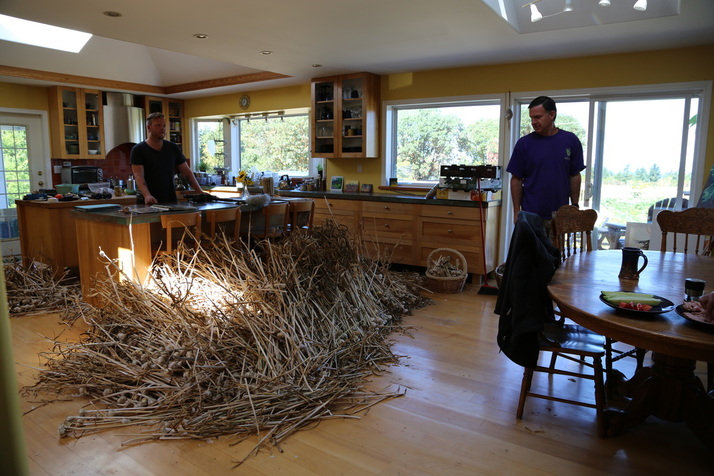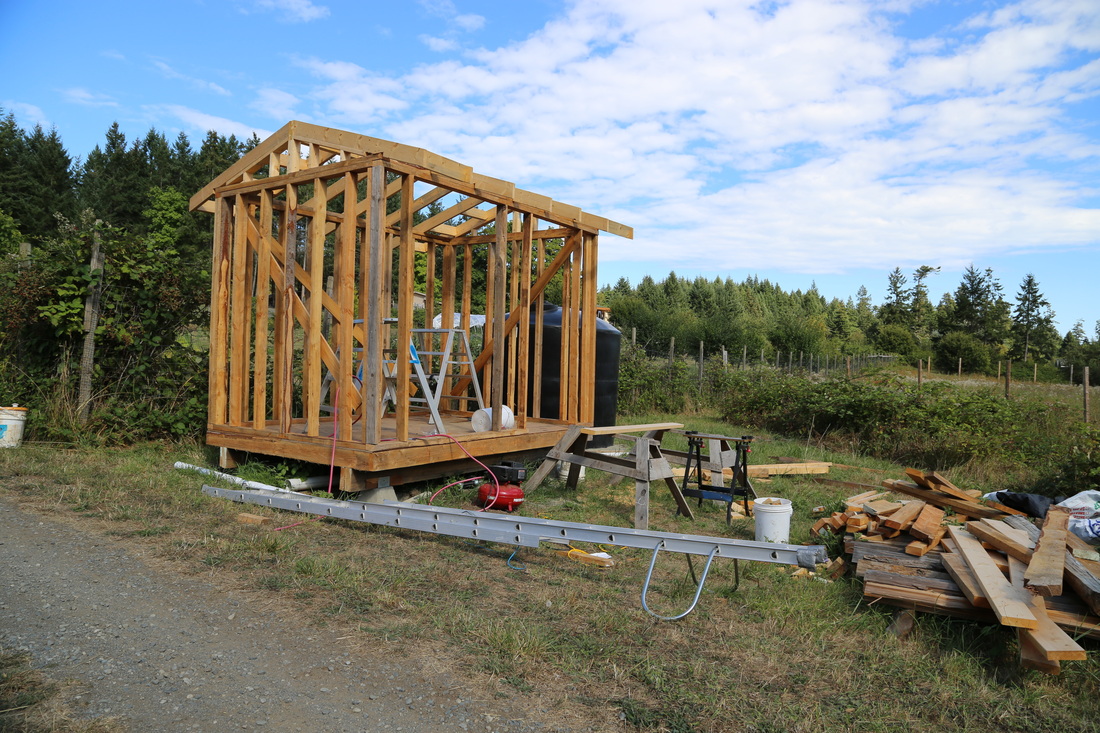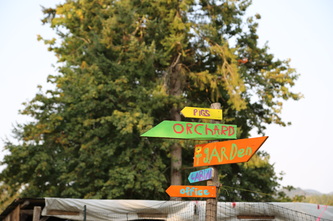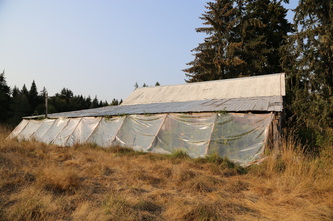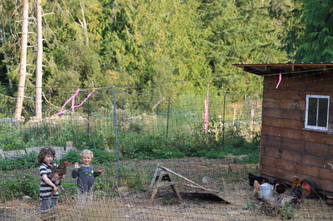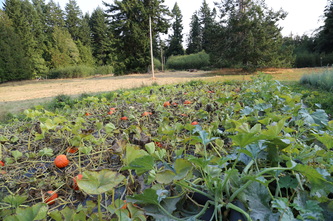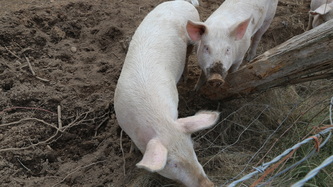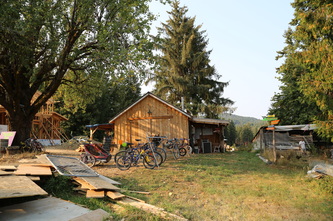A naturally lit greenhouse pumps out tomatoes for most of the year at Haliburton Community Farm in Saanich, BC
The Farms and farmers
Special thanks to the many farmers and others involved in the organic farming community on the Gulf Islands and Southern Vancouver Island who took time from their busy days to share their wisdom and insight into how they ply their trade and live their lives. Their personal motivations for farming organically and the community-oriented attitudes present throughout the film are the most fascinating aspects of this documentary .
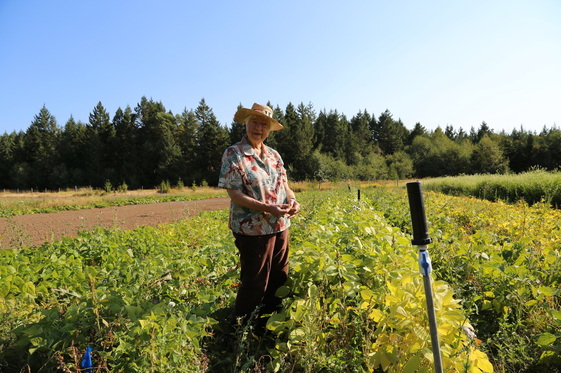
Barbara Ebel, Nanoose Edibles, Nanoose Bay
I lucked out the day I stopped in at Nanoose Edbles to speak with the enlightening and uplifting Barbara Ebel. I had been told I had to meet her and, she lived up to the hype. Her organic farm has a plethora of crops surrounded towering forests and complimented by a buzzing Bee rehabilitation project. IF you are ever near Nanaimo, BC be sure to make the effort and visit Nanoose Edibles. Barbara shared her wisdom from over 25 years experience in farming and using organic methods. Nanoose Edibles sells an abundance of different fruit and veggies to restaurants as far away as Tofino. and to many happy local customers in the area. Barbara and her husband Lorne also open up their land and invite people to come and learn about farming in the field, but the reality is that farming is hard work and takes years to learn. Be ready to get your hands dirty and work up a good sweat if you want to give it a shot. She is a big believer in community-supported agriculture and sees co-op models as being the most viable, given the modern food security challenges facing farmers hoping to enter the trade.
I lucked out the day I stopped in at Nanoose Edbles to speak with the enlightening and uplifting Barbara Ebel. I had been told I had to meet her and, she lived up to the hype. Her organic farm has a plethora of crops surrounded towering forests and complimented by a buzzing Bee rehabilitation project. IF you are ever near Nanaimo, BC be sure to make the effort and visit Nanoose Edibles. Barbara shared her wisdom from over 25 years experience in farming and using organic methods. Nanoose Edibles sells an abundance of different fruit and veggies to restaurants as far away as Tofino. and to many happy local customers in the area. Barbara and her husband Lorne also open up their land and invite people to come and learn about farming in the field, but the reality is that farming is hard work and takes years to learn. Be ready to get your hands dirty and work up a good sweat if you want to give it a shot. She is a big believer in community-supported agriculture and sees co-op models as being the most viable, given the modern food security challenges facing farmers hoping to enter the trade.
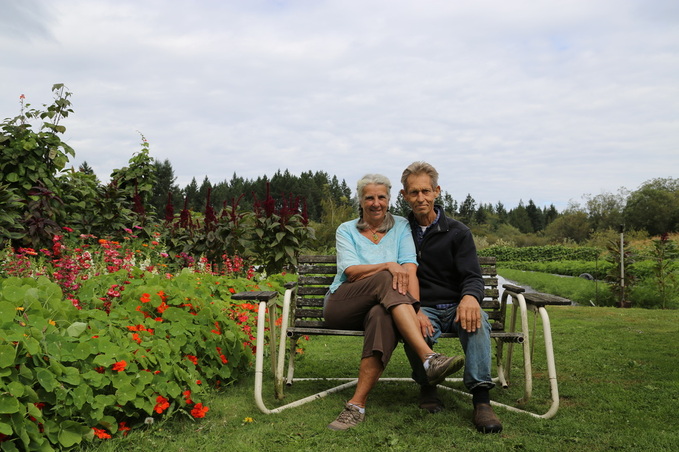
Bob Sheilds and Maureen Holland, Good Earth Farm, Gabriola Island
Bob Shields and his wife Maureen Holland grow artisan quality organic fruit and vegetables on the relatively small plot of land (4 acres) they bought for $30,000 17 years ago. Much of the land they farm is under water during the winter but you wouldn't know it if you stop by mid-summer and see the stunning crops producing some of the finest fruit and veggies you will see anywhere. The key to success according to Bob is "to stay small, grow high quality veggies and to live a simple life style". Maureen started her venture by growing and selling flowers, thus beside the bustling market garden you'll discover a sea of flowers, where bees work diligently and play a vital role in pollinating the crops. Since supermarkets don't give Bob and Maureen the value their crops warrant, they sell their food on-site, occasionally at farmers markets, and to happy locals who get to eat the fruits and vegetables of Good Earth.
Bob Shields and his wife Maureen Holland grow artisan quality organic fruit and vegetables on the relatively small plot of land (4 acres) they bought for $30,000 17 years ago. Much of the land they farm is under water during the winter but you wouldn't know it if you stop by mid-summer and see the stunning crops producing some of the finest fruit and veggies you will see anywhere. The key to success according to Bob is "to stay small, grow high quality veggies and to live a simple life style". Maureen started her venture by growing and selling flowers, thus beside the bustling market garden you'll discover a sea of flowers, where bees work diligently and play a vital role in pollinating the crops. Since supermarkets don't give Bob and Maureen the value their crops warrant, they sell their food on-site, occasionally at farmers markets, and to happy locals who get to eat the fruits and vegetables of Good Earth.
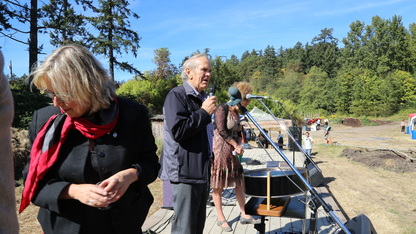
Madrona Farm and Chef Survival Challenge, Saanich
It's not everyday you get to hang out with Green Party Leader Elizabeth May, farming guru Harold Steves, and half a dozen Olympians. If you are able to make the Chef Survival Challenge at Madrona Farm you will encounter a mix of politicians, celebrities and some of the top Chefs from around the Victoria area. Chef Survival is a fun day in support of some of the many serious food security challenges facing people who live in the greater Victoria area. As Nathalie Chambers of Madrona Farm says, "You might see the shelves of local super markets full of food and think that there isn't a food security crisis, but oh boy, there sure is. What you don't see is the loss of viable farmland to development, the toxic fertilizers used to cultivate food, the gasses and plastics involved in storage and transport, and the aging farmer populace hoping to sell their land but no farmers able to buy". Despite the doom and gloom, Madrona Farm is a model for sustainable agriculture. While Nathalie's husband Dave works hard in the fields farming some 104 different crops, harvesting throughout the year, Nathalie, a restoration ecologist, is working to share the Madrona model with the world. The story of Madrona Farm is fascinating. In short, Dave Chambers' family had owned the land for over 50 years when it faced being subdivided and potentially sold off as the farm was inherited by multiple family members. That's when Nathalie and Dave decided to see if the community would support them in securing the farm to avoid any potential development. According to Nathalie, "All we needed to do was to raise 2 million dollars, so being the dreamer I am, we went out and did it!". The Land Conservancy (TLC) owns Madrona farm now after some 4500 people helped raise the monies needed to save the farm and ensure the TLC could sustain ownership. This allows Dave and Nathalie to lease the land and to make investments in the land over the years so that they will hopefully be able to sell off to the next farmer(s) who buy the lease to operate the farm from the TLC. If you stop by Madrona Farm on a Friday, you'll notice a line-up of people waiting for the market stand to open, and if you don't arrive early, most of the produce is gone. You can also enjoy the fruits of Dave and Nathalie's labour at many of the top restaurants in town who source food from Madrona. This year Chef Survival Challenge is expanding to Vancouver, where the food security challenges are just as or more serious, as farmland has rapidly disappeared over the last 50 years at a faster rate. Madrona Farm is located 15 minutes from downtown Victoria and is a model for sustainable agriculture and biodiversity, so be sure to stop by.
It's not everyday you get to hang out with Green Party Leader Elizabeth May, farming guru Harold Steves, and half a dozen Olympians. If you are able to make the Chef Survival Challenge at Madrona Farm you will encounter a mix of politicians, celebrities and some of the top Chefs from around the Victoria area. Chef Survival is a fun day in support of some of the many serious food security challenges facing people who live in the greater Victoria area. As Nathalie Chambers of Madrona Farm says, "You might see the shelves of local super markets full of food and think that there isn't a food security crisis, but oh boy, there sure is. What you don't see is the loss of viable farmland to development, the toxic fertilizers used to cultivate food, the gasses and plastics involved in storage and transport, and the aging farmer populace hoping to sell their land but no farmers able to buy". Despite the doom and gloom, Madrona Farm is a model for sustainable agriculture. While Nathalie's husband Dave works hard in the fields farming some 104 different crops, harvesting throughout the year, Nathalie, a restoration ecologist, is working to share the Madrona model with the world. The story of Madrona Farm is fascinating. In short, Dave Chambers' family had owned the land for over 50 years when it faced being subdivided and potentially sold off as the farm was inherited by multiple family members. That's when Nathalie and Dave decided to see if the community would support them in securing the farm to avoid any potential development. According to Nathalie, "All we needed to do was to raise 2 million dollars, so being the dreamer I am, we went out and did it!". The Land Conservancy (TLC) owns Madrona farm now after some 4500 people helped raise the monies needed to save the farm and ensure the TLC could sustain ownership. This allows Dave and Nathalie to lease the land and to make investments in the land over the years so that they will hopefully be able to sell off to the next farmer(s) who buy the lease to operate the farm from the TLC. If you stop by Madrona Farm on a Friday, you'll notice a line-up of people waiting for the market stand to open, and if you don't arrive early, most of the produce is gone. You can also enjoy the fruits of Dave and Nathalie's labour at many of the top restaurants in town who source food from Madrona. This year Chef Survival Challenge is expanding to Vancouver, where the food security challenges are just as or more serious, as farmland has rapidly disappeared over the last 50 years at a faster rate. Madrona Farm is located 15 minutes from downtown Victoria and is a model for sustainable agriculture and biodiversity, so be sure to stop by.
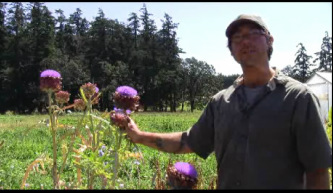
Ian King, Manager at Sea Bluff Farm, Metchosin (now residing in Hafford, Saskatchewan)
Ian King, his wife Christina, and their two young children were all laughing as the kids played in the new sandbox that was recently built for enjoyment at Sea Bluff Farm. While the kids played, Ian showed me around the farm situated in beautiful Metchosin, BC. As the name Sea Bluff implies, the farm is located right next to the beach, where you can see a mist in the air as you drive towards the farm on most days. Seaweed from the near-by beach is harvested and used to compliment the organically rich soils the crops are grown in, and according to Ian, the results are fantastic. Ian's family gets to live on the land they lease from the owner, who lives in the upper level of a quaint farmhouse overlooking the farm. According to Ian, "Leasing the land and the equipment on it allows for the opportunity to focus on growing food, marketing it and selling it, hopefully with something to show for it at the end of the year". Ian sells most of the food they harvest at Sea Bluff at the Moss Street Market in Victoria, and at the local Metchosin Farmers Market.
Despite wanting to stay in the Greater Victoria region, and intending to stay at Sea Bluff for 2 more years in August of 2012, by December the same year, Ian and his family had packed up and moved to Hafford, Saskatchewan, where they had access to more affordable land and a more ideal living situation. This example shows how, although having access to the land is helping farmers gain experience, many farmers today aren't able to build that long term relationship and experiential-based knowledge of the land because of the entry barriers.
Ian King, his wife Christina, and their two young children were all laughing as the kids played in the new sandbox that was recently built for enjoyment at Sea Bluff Farm. While the kids played, Ian showed me around the farm situated in beautiful Metchosin, BC. As the name Sea Bluff implies, the farm is located right next to the beach, where you can see a mist in the air as you drive towards the farm on most days. Seaweed from the near-by beach is harvested and used to compliment the organically rich soils the crops are grown in, and according to Ian, the results are fantastic. Ian's family gets to live on the land they lease from the owner, who lives in the upper level of a quaint farmhouse overlooking the farm. According to Ian, "Leasing the land and the equipment on it allows for the opportunity to focus on growing food, marketing it and selling it, hopefully with something to show for it at the end of the year". Ian sells most of the food they harvest at Sea Bluff at the Moss Street Market in Victoria, and at the local Metchosin Farmers Market.
Despite wanting to stay in the Greater Victoria region, and intending to stay at Sea Bluff for 2 more years in August of 2012, by December the same year, Ian and his family had packed up and moved to Hafford, Saskatchewan, where they had access to more affordable land and a more ideal living situation. This example shows how, although having access to the land is helping farmers gain experience, many farmers today aren't able to build that long term relationship and experiential-based knowledge of the land because of the entry barriers.
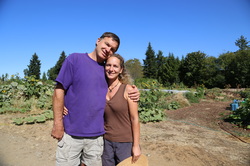
Dirk Becker and Nicole Shaw, Compassion Farm, Lantzville, BC
It was raining garlic the day I met with Dirk Becker and Nicole Shaw of Compassion Farm situated in a residential area in Lantzville just outside of Nanaimo, BC. Dirk and Nicole have been embroiled in a public battle with their neighbor and the District of Lantzville over the organic farm they have set up on their acreage, where they donate some of their harvest to people suffering from chronic diseases. To protect their right to grow food, Dirk is calling for a Right to Farm Act. Dirk and Nicole practice small plot intensive farming, a technique that Dirk informs me goes back thousands of years in Asia. They grow a lot of different crops on a small plot of land, making the use of machines, aside from a small pick-up truck for transport to market, minimal. In August 2012 Dirk was expressing a sense of hope as he believed he was winning the battle to keep growing food for personal consumption and for sale on his land. But by May 2013, Dirk and Nicole announced they were putting their home up for sale. To learn more go to the Save Compassion Farm webpage. Dirk wonders, "Why is it the norm to have a lawn laced with pesticides instead of using the land to grow healthy organic food? Every Saturday my neighbours practice what I like to call car worship day, as they worship and polish their cars for hours". Dirk sent me on my way with enough garlic for most of the winter, and produce for a week.
It was raining garlic the day I met with Dirk Becker and Nicole Shaw of Compassion Farm situated in a residential area in Lantzville just outside of Nanaimo, BC. Dirk and Nicole have been embroiled in a public battle with their neighbor and the District of Lantzville over the organic farm they have set up on their acreage, where they donate some of their harvest to people suffering from chronic diseases. To protect their right to grow food, Dirk is calling for a Right to Farm Act. Dirk and Nicole practice small plot intensive farming, a technique that Dirk informs me goes back thousands of years in Asia. They grow a lot of different crops on a small plot of land, making the use of machines, aside from a small pick-up truck for transport to market, minimal. In August 2012 Dirk was expressing a sense of hope as he believed he was winning the battle to keep growing food for personal consumption and for sale on his land. But by May 2013, Dirk and Nicole announced they were putting their home up for sale. To learn more go to the Save Compassion Farm webpage. Dirk wonders, "Why is it the norm to have a lawn laced with pesticides instead of using the land to grow healthy organic food? Every Saturday my neighbours practice what I like to call car worship day, as they worship and polish their cars for hours". Dirk sent me on my way with enough garlic for most of the winter, and produce for a week.
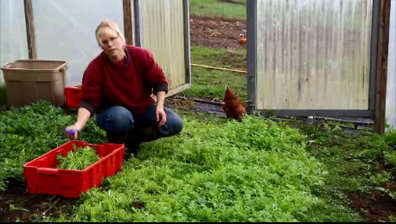
Heather Stretch, Co-Owner, Saanich Organics, Saanich, BC
When I first met Heather, it was mid summer at the Moss Street market, and she was swamped with customers. I got her business card but I didn't catch up with her until Mid-February, when she was still busy harvesting. Outside the sunlit greenhouse, several chickens had escaped from their coop, and we were interrupted by one of the returning chickens as Heather was busily gathering greens for a nice fresh salad mix to be sold the next day at the Victoria Winter Market.
Some 17 years ago, Heather got a phone call from an aunt who invited her to come try farm some family land in Saanich, BC. Unlike many young farmers, Heather never did an apprenticeship and decided to tackle farming head on. Heather learned a few hard lessons along the way, and over the years she has learned the intricacies of the land, although the learning never stops. She is proud of how far the land has come over the years as she has carefully built up the soil. Her family lives on the land, but they aren't the only ones farming it. Two other groups farm the land, and every year she brings an apprentice to live and work on the farm. Heather tells me it's almost the same cost to have an apprentice board on the farm as to hire help when needed. But the rewards of training people interested in farming are worth it according to Heather, and by the end of the year they get to know the lay of the land fairly well. Heather and her business partners Robin Tunnicliff and Rachel Fisher wrote a book about their farm and methods called All the Dirt- Reflections on organic farming . Saanich Organics employs a full-time marketer who ensures local restaurants, markets, box program customers and commercial enterprises get a variety of foods grown on the three operating businesses on the farm. Like many of the farms I visited in the Greater Victoria area, subdivisions have sprouted up and monster houses line adjacent the slope to the farm. The pressures of the urban environment also allow the business on the farm to operate. I joked with Heather about what she would do in the event of an emergency if many people suddenly showed up at the farm trying to get food. She joked, "Jack my prices!!". The reality of Vancouver Island facing a situation where people might indeed have to seek food from local farms is quite real as the Gulf Islands and Vancouver Island are situated on the "ring of fire" in an area that was extremely active in the past.
When I first met Heather, it was mid summer at the Moss Street market, and she was swamped with customers. I got her business card but I didn't catch up with her until Mid-February, when she was still busy harvesting. Outside the sunlit greenhouse, several chickens had escaped from their coop, and we were interrupted by one of the returning chickens as Heather was busily gathering greens for a nice fresh salad mix to be sold the next day at the Victoria Winter Market.
Some 17 years ago, Heather got a phone call from an aunt who invited her to come try farm some family land in Saanich, BC. Unlike many young farmers, Heather never did an apprenticeship and decided to tackle farming head on. Heather learned a few hard lessons along the way, and over the years she has learned the intricacies of the land, although the learning never stops. She is proud of how far the land has come over the years as she has carefully built up the soil. Her family lives on the land, but they aren't the only ones farming it. Two other groups farm the land, and every year she brings an apprentice to live and work on the farm. Heather tells me it's almost the same cost to have an apprentice board on the farm as to hire help when needed. But the rewards of training people interested in farming are worth it according to Heather, and by the end of the year they get to know the lay of the land fairly well. Heather and her business partners Robin Tunnicliff and Rachel Fisher wrote a book about their farm and methods called All the Dirt- Reflections on organic farming . Saanich Organics employs a full-time marketer who ensures local restaurants, markets, box program customers and commercial enterprises get a variety of foods grown on the three operating businesses on the farm. Like many of the farms I visited in the Greater Victoria area, subdivisions have sprouted up and monster houses line adjacent the slope to the farm. The pressures of the urban environment also allow the business on the farm to operate. I joked with Heather about what she would do in the event of an emergency if many people suddenly showed up at the farm trying to get food. She joked, "Jack my prices!!". The reality of Vancouver Island facing a situation where people might indeed have to seek food from local farms is quite real as the Gulf Islands and Vancouver Island are situated on the "ring of fire" in an area that was extremely active in the past.
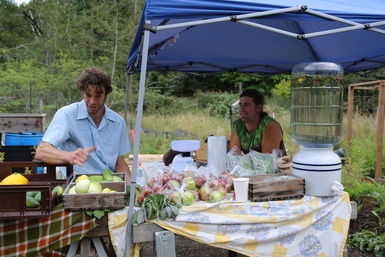
Pollon Heath and Stephen Levesque, Watercliff Permaculture Farm, Gabriola Island
Research suggests that organic farming can enhance community development socially, economically and environmentally. With examples of this are Stephen Levesque, Pollen Heath and their families who have gained access to farm on what was once a neighbour's unused land. I found them on a Thursday afternoon, when they were finally harvesting the benefits of 5 months hard work building up the land into a teeming permaculture market garden. They serve the surrounding community on an area tucked away on Garbriola Island. Stephen Levesque managed to talk one of his neighbours into allowing him to start a small permaculture farm on a somewhat damp, unused hay field where locals had been dumping debris such as fallen tree limbs and brush. Stephen explained to me that the old wood piles made perfect materials for the raised-bed system that Stephen, Pollen Heath and their families and friends had turned into a thriving farm.
Research suggests that organic farming can enhance community development socially, economically and environmentally. With examples of this are Stephen Levesque, Pollen Heath and their families who have gained access to farm on what was once a neighbour's unused land. I found them on a Thursday afternoon, when they were finally harvesting the benefits of 5 months hard work building up the land into a teeming permaculture market garden. They serve the surrounding community on an area tucked away on Garbriola Island. Stephen Levesque managed to talk one of his neighbours into allowing him to start a small permaculture farm on a somewhat damp, unused hay field where locals had been dumping debris such as fallen tree limbs and brush. Stephen explained to me that the old wood piles made perfect materials for the raised-bed system that Stephen, Pollen Heath and their families and friends had turned into a thriving farm.
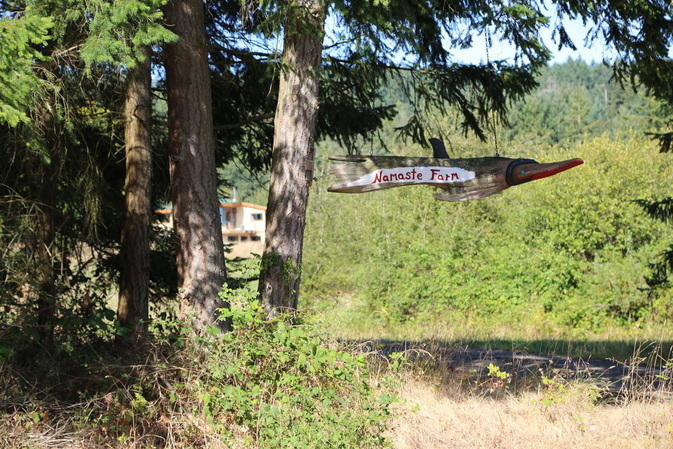
John Peirce, Namaste Farm, Gabriola Island
Another example of someone opening up private land to the community can be found on Gabriola Island, where you’ll find John Peirce, a geophysist who made the move from Calgary to what was an overgrown, but spring-water abundant farm. He has invested his time, money and a lot of hard labour to bring the land back to life. He’s not only growing food for his family- he currently allows two other groups to grow a variety of crops on his property, and is investing his money so others on the South end of Gabriola can grow food in allotment gardens on his family’s property.
Another example of someone opening up private land to the community can be found on Gabriola Island, where you’ll find John Peirce, a geophysist who made the move from Calgary to what was an overgrown, but spring-water abundant farm. He has invested his time, money and a lot of hard labour to bring the land back to life. He’s not only growing food for his family- he currently allows two other groups to grow a variety of crops on his property, and is investing his money so others on the South end of Gabriola can grow food in allotment gardens on his family’s property.
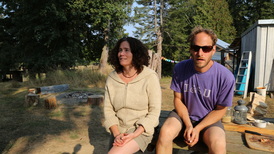
Mary Coll and Steve Unger, InsihOge Farm, Sooke, BC
Mary Coll, Steve Unger and their two children have recently made a major lifestyle switch, moving from East Vancouver to a 130 acre farm in Sooke, BC. Steve and Mary are creating a permaculture project on their property and they are opening their land for other people such as ALM Farm who are growing seed crops. There's a lot more land available to farm at InshOge and Steve and Mary are open to offers from interested parties. Working with neighbours has helped Steve and Mary get through the challenges of trying to establish a productive farm with limited farming experience. After moving from Vancouver a
Mary Coll, Steve Unger and their two children have recently made a major lifestyle switch, moving from East Vancouver to a 130 acre farm in Sooke, BC. Steve and Mary are creating a permaculture project on their property and they are opening their land for other people such as ALM Farm who are growing seed crops. There's a lot more land available to farm at InshOge and Steve and Mary are open to offers from interested parties. Working with neighbours has helped Steve and Mary get through the challenges of trying to establish a productive farm with limited farming experience. After moving from Vancouver a
Special Thanks
Special thanks to several other farmers and interviewees who shared their wisdom and knowledge by contributing to Harvesting Community:
Lisa Loyd, Jennifer Loyd and Elizabeth Young of Stowell Lake Farm, Salt Spring, BC
Susan Zupanec, Just Another Weedpatch
Elmarie Roberts, Haliburton Community Farm
Robin Jackson, Sooke, BC
Lisa Butler, Watercliff Permaculture Farm, Gabriola
New Mountain Farm run by Mike Nyberg and Nate Poetger at Haliburton Community FarmCindy Dreger and Deanna Danychuk of Ingredients Health Food and Apple Café
Lisa Loyd, Jennifer Loyd and Elizabeth Young of Stowell Lake Farm, Salt Spring, BC
Susan Zupanec, Just Another Weedpatch
Elmarie Roberts, Haliburton Community Farm
Robin Jackson, Sooke, BC
Lisa Butler, Watercliff Permaculture Farm, Gabriola
New Mountain Farm run by Mike Nyberg and Nate Poetger at Haliburton Community FarmCindy Dreger and Deanna Danychuk of Ingredients Health Food and Apple Café

